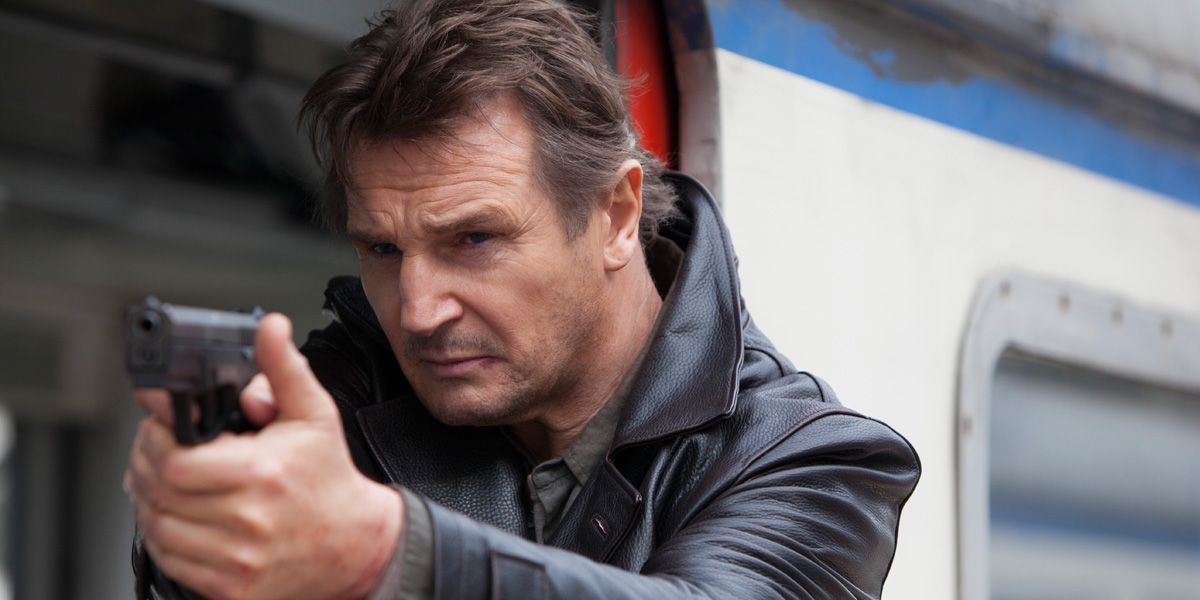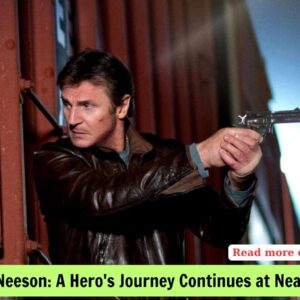In Retribution, the septuagenarian plays a man stuck in a vehicle he can’t escape—an apt metaphor for his late-career pivot to action films.

About 15 years ago, Liam Neeson picked up a cellphone and growled a haunting, threatening monologue that changed the course of his career. Playing the hardened ex-CIA agent Bryan Mills in the movie Taken, Neeson warned the men who’d kidnapped his teenage daughter about his “very particular set of skills, skills I have acquired over a very long career, skills that make me a nightmare for people like you.
” It was the beginning of a surprising renaissance for the esteemed actor. In his mid-50s, he became an action star, headlining a long run of cheaply made, typically European-set thrillers in which he played gun-toting men in leather jackets with, well, murderous skills.

Learn moreThere are too many of these movies to name, and they tend to be better known by a one-sentence plot description. Neeson on a plane? That’s the marvelous Non-Stop. On a train? The decently schlocky The Commuter. Neeson at a ski resort? Cold Pursuit. Neeson as an ice-road trucker? They just called that one The Ice Road.
Further evidence that the studios are running out of ideas for him comes in Neeson’s latest effort, the depressingly blank Retribution, which shamelessly steals the premise of another famous film.
Neeson plays a financier, Matt Turner, who gets into his car with his kids one day and then is told via ominous phone call that if he or anyone else gets out, the vehicle will explode. Yes, that’s very much like the 1994 Keanu Reeves classic Speed, which is about a bus that can’t slow down lest it blow up.
In Retribution, Matt can park the car every so often to catch his breath; he just can’t get out. This is a writing decision that robs the film of any possible chance at gaining momentum, and also perhaps best exemplifies Neeson’s career over the past decade and a half.
He’s certainly found consistent work as a statelier Sylvester Stallone, playing aging tough guys with an Irish-accented tint to their one-liners, but the novelty of such parts began to fade long ago.
Moreover, his performance in Retribution does not have the aggressive sting that made Taken such a surprise hit. Matt is not bragging about a particular set of skills; instead, he’s weakly begging, “I just want my life back!”
When Neeson starred in Taken, he was some 30 years into a filmography that included genre fun (Darkman, The Haunting), serious biopics (Michael Collins, Kinsey), an Oscar nomination for his masterful work in Schindler’s List, and a leading role in Star Wars: Episode I—The Phantom Menace. When he did action, it was usually in a more highbrow mold, such as in the period drama Rob Roy and Christopher Nolan’s Batman Begins.
At his age, Neeson wasn’t exactly about to become a skilled martial artist. His pivot was not like Keanu Reeves’s eventual career revival in John Wick, which centered on acrobatic abilities that the actor had picked up in his younger days on movies such as The Matrix. Taken and its many imitators were dime-store thrillers that felt thin on bone-crunching action.
Neeson would shoot some folks—maybe there’d be a car chase or two—but some very heavy editing would usually sell the stunt work (this fence jump from Taken 3 is a notorious example).
Still, repeatedly, Neeson brought a haunted quality to each of his protagonists that elevated them. The Taken movies are essentially junk, yet when Neeson summons his character’s dormant secret-agent abilities to rescue his daughter, he portrays it as grimly tragic, the reopening of a box he had sealed shut.
In his four collaborations with the filmmaker Jaume Collet-Serra (Unknown, Non-Stop, Run All Night, and The Commuter), Neeson invested each new character with some burdensome emotional history, making his shift to heroism feel properly earned, a triumph over divorce, alcoholism, or being a bad parent.
Retribution, which is being released nationwide in theaters this weekend, tries its best to throw the familiar Neeson ingredients into the soup. Even though many years have passed since Taken, Neeson is somehow still playing a father to similar-aged children; Matt’s teenage son and daughter (played by Jack Champion and Lilly Aspell) are strapped into his explosive car with him.
Most of the action sees Matt driving around while arguing on the phone with an unnamed terrorist using a voice disguiser, even though there’s no real chance for compelling back-and-forth, given that his enemy’s line readings sound entirely computerized. Worst of all for this kind of thriller, Matt is passive and confined in a vehicle, unable to really use his limited surroundings creatively.

The director of Retribution is the Hungarian American filmmaker Nimród Antal, who once seemed like he might be another great “vulgar auteur” like Collet-Serra, a master of churning out above-average genre films in an industry that’s grown more and more obsessed with big budgets.
Yet after a promising start, Antal’s career has sputtered out, and Retribution feels entirely phoned-in, with no visual effort to dramatize the claustrophobia of Matt’s situation.
Meanwhile, Collet-Serra has found himself lost in the world of franchises, directing two underwhelming blockbusters starring Dwayne Johnson (Jungle Cruise and Black Adam)—a sad indication that the quality mid-budget movies that began Neeson’s late-career revival might not be viable for anyone anymore. Neeson himself has done admirable work making mid-budget throwbacks with a little extra grit and gravitas. But it might be time for him to retire that very particular set of skills.
News
“Liam Neeson’s Surprise: Shocking Appearance Raises Eyebrows on the Street”
Liam Neeson, 63 years old, famous actor with a series of roles in action movies: “Taken”, “Non-stop”… appeared thin and haggard on the streets of New York…
“Liam Neeson on Embracing Action Roles at 70: ‘I’m Getting Away with It’”
Liam Neeson is looking back at becoming an unlikely action star with 2008’s Taken Liam Neeson’s age isn’t getting in the way of his status as an action…
Liam Neeson refuses superhero movies, still acts in action movies
Although Liam Neeson has no plans to star in any more superhero movies, he said he will continue to participate in action movies. (Photo: The Playlist) Liam…
“Liam Neeson Delves into ‘Honest Thief’, Reflects on ‘Darkman’ Memories, and Addresses the Star Wars Reunion Rumors”
He also reveals which of his films he’d love to have revisited with a sequel. From writer/director Mark Williams (co-creator of the Netflix series Ozark), the crime drama Honest Thief tells the…
Liam Neeson’s action thriller suffers due to predictable twists, rushed ending
Liam Neeson’s Retribution is strictly a one-time watch for action star’s fans. However, a few of them might get disheartened as well. Liam Neeson’s films of late…
“Is ‘Made In Italy’ Worth the Watch? Analyzing Liam Neeson’s Movie Reviews and Rotten Tomatoes Scores”
The Liam Neeson movie Made In Italy is currently proving surprisingly popular on Netflix, but is this largely forgotten 2020 dramedy worth watching? SUMMARY Made In Italy…
End of content
No more pages to load







